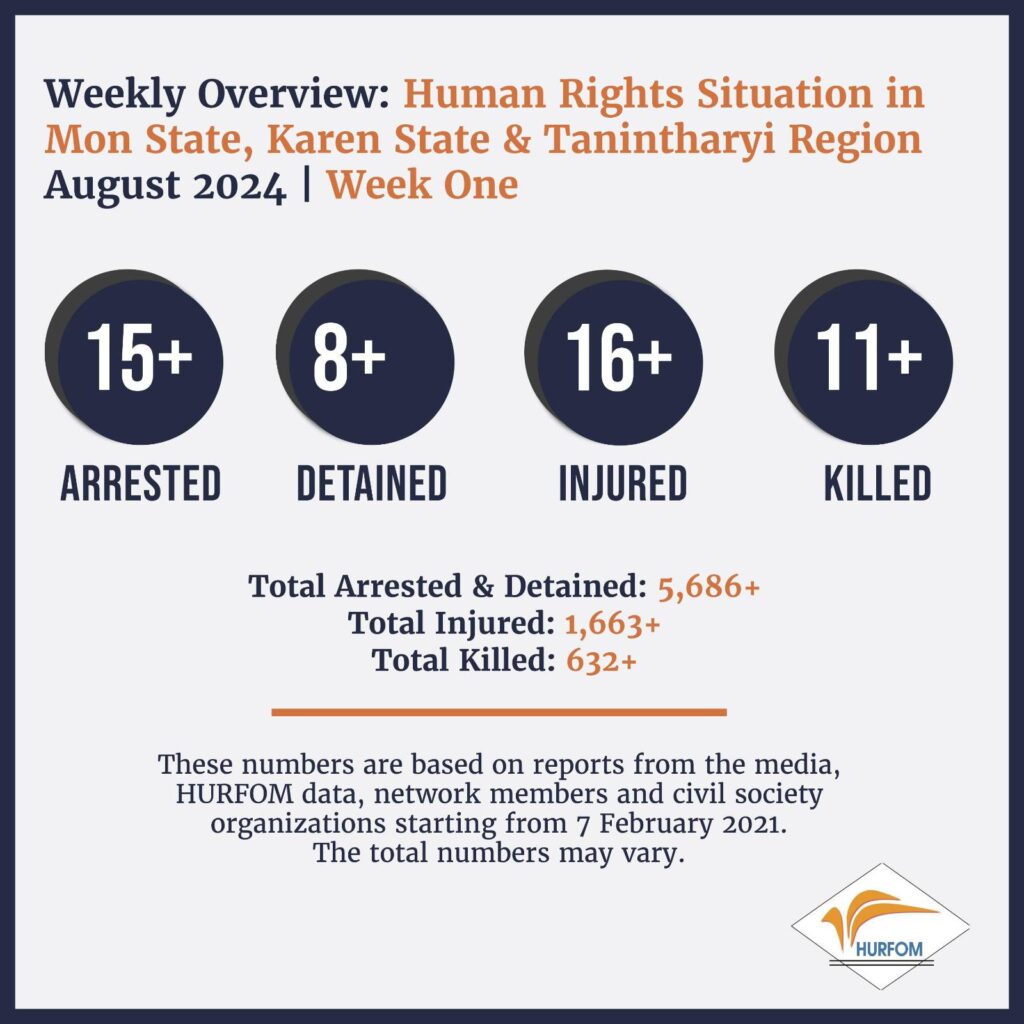Weekly Overview: Human Rights Situation in Mon State, Karen State and Tanintharyi Region
August 5, 2024
Flooding in Southeastern Burma Adds to Daily Challenges for Locals
HURFOM: Now, more than halfway through the year, the Human Rights Foundation of Monland (HURFOM) continues to report worrying increases in the widespread crimes being perpetrated against innocent civilians by the junta. By the end of July, HURFOM’s June monthly overview numbers had doubled. The reported figures are as follows: 107 people were arbitrarily arrested, 52 were injured, 110 were mistreated, and nearly 60 were killed. In addition, 75,000 people were forced to leave their homes due to violence by the junta as they intensified their offensives in local areas, with 120 homes damaged in July alone.

The significant and destructive effects of climate change are adding to an already difficult situation for local residents. Mon State has experienced rainstorms that led to flooding in more than 100 villages, impacting thousands of people, as reported by local residents and officials from social relief groups.
Since July 23rd, heavy monsoons have led to flooding in several townships across Mon State, including Bilin, Thaton, Paung, Mawlamyine, Chaungzon, Thanbyuzayat, Ye, and Mudon. Villages in low-lying areas and along the coast, about 20 miles from the sea, have been particularly affected. In Kyaung Ywar village, floodwaters continued to rise, reaching up to 16 feet by 6 AM on July 28th.
“The lower parts of Kyaung Ywar and Mok Kanin villages are underwater. In some areas, boats are the only means of transport,” said a resident of Mok Kanin.
During the Bilin-Ye flood, more than 2,000 residents from urban areas were transported to temporary rescue shelters. However, according to social relief officials, villagers have been relocating to safer places. The Department of Meteorology and Hydrology announced on July 27th that the Bilin River and the Thanlwin River had exceeded their warning levels.
“All the low-lying areas in Bilin are underwater. People are relocating. Some are staying at home and monitoring the water levels,” said a Bilin resident. On July 28, the Bilin River reached 33.53 feet (1,022 centimetres), exceeding the warning level by about 1.5 feet (44 centimetres).
Although rescue teams face a shortage of motorboats and other essential supplies to reach the flooded villages, the junta has proved to be unreliable and has failed to assist populations in need. The gaps in assistance are being filled by local humanitarian response groups and civil society organizations. However, travel is still restricted due to the military’s main checkpoints and there are serious food and clean water shortages.
Parts of the Yangon-Dawei road, including junctions in Bilin, Thaton, Paung, Mudon, Thanbyuzayat, and Ye townships, are flooded, making it challenging for vehicles to pass through. On the same day, Bilin and Kyaik Kaw road sections were also flooded, leading to temporary closures.
Because of the heavy rain, sickness and malnutrition are increasing. Since July 2024, there has been a significant rise in diarrhea cases among displaced people in three camps in Pu Law Township, Tanintharyi Region. As organizations supporting the IDPs reported, this sudden increase has created an urgent need for medical assistance.
Due to the ongoing conflict, the displaced persons have been unable to return home. Inadequate access to clean drinking water, poor sanitation, and a lack of proper living conditions have contributed to the rise in diarrhea cases this year. Approximately 1,500 displaced villagers in Pu Law are experiencing diarrhea during the rainy season. The conflict and seasonal challenges have hindered timely access to medication.

In May and June, nearly all the displaced villagers in the Pu Law camps suffered from malaria, and there were also medication shortages during that time. In June, clashes and airstrikes in the Tanintharyi Region forced over 50,000 people to flee their homes, with more than 20,000 of these displaced people coming from Myeik District’s Pu Law and Tanintharyi Townships. The ongoing conflict and seasonal health challenges have created a critical need for increased medical support and supplies to address the health crises in these IDP camps.



















































